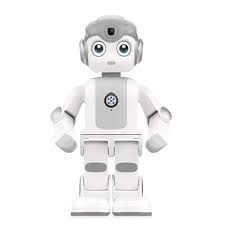Alpha Mini
UBTECH RoboticsEducation
Available
Overall Score56/100
$1,699
Compact educational humanoid robot with 14 DOF designed for STEM learning and entertainment. Features LCD eyes, voice interaction, programming capabilities, and 4G connectivity for interactive learning experiences.
Height:0.245m
Weight:0.7kg
Released:2018
Last Tested:2020-01-01

Demo Video
Alpha Mini Performance Profile
Robot
Human Baseline
45
Mobility
(20%)
15
Explosive
(10%)
60
Stability
(15%)
25
Dexterity
(20%)
65
Perception
(15%)
70
Language
(10%)
85
Safety
(5%)
50
Energy
(5%)
75
Generalization
(5%)
80
Maintenance
(5%)
Specifications
Height0.245m
Weight0.7kg
Degrees of Freedom14 (head:3, arms:4, waist:1, legs:6)
Actuator Type14 high-performance servo motors
Power Source3.85V 4060mAh Li-Po battery
Operating TimeVariable (educational use)
Sensors13MP camera, 4-mic array, distance sensor, IMU
ComputingARM processor, 2GB RAM, 16GB ROM
Key Features
14 high-performance servo motors
LCD eye displays with rich expressions
Visual programming with Blockly/Scratch
13MP camera with face and object recognition
4G LTE connectivity and WiFi support
Test Info
Last Tested
2020-01-01
Test Location
Educational Testing Facility
Certifications
Educational Safety StandardsChild Toy Safety
Detailed Test Results
10-Dimensional EvaluationWalking Speed
30/ 100m/s
Slow but stable movement for educational demonstrations
Performance vs Human Baseline30%
Test Method: Controlled movement test
Endurance
40/ 100hours
Limited by small battery capacity
Performance vs Human Baseline40%
Test Method: Continuous operation test
Agility
65/ 100score
14 DOF enables dance and martial arts demos
Performance vs Human Baseline65%
Test Method: Movement demonstration test
Category Average:45/100
Weight:20%
Human Baseline:100/100
10-Dimensional Test Protocol
All tests conducted according to the comprehensive humanoid robot evaluation standards with human performance as baseline (100%). The new system evaluates: Mobility (20%), Dexterity (20%), Stability (15%), Perception (15%), Explosive Power (10%), Language (10%), and four supporting dimensions (5% each).
Advantages
Excellent educational platform with visual programming
Rich emotional expression through LCD eyes
Comprehensive connectivity (4G, WiFi, Bluetooth)
Child-safe design with high-quality materials
Affordable for educational institutions
Limitations
Very limited practical manipulation capability
Short battery life for extended use
Restricted to flat surface movement only
Small size limits payload capacity
Primarily demonstration rather than functional robot